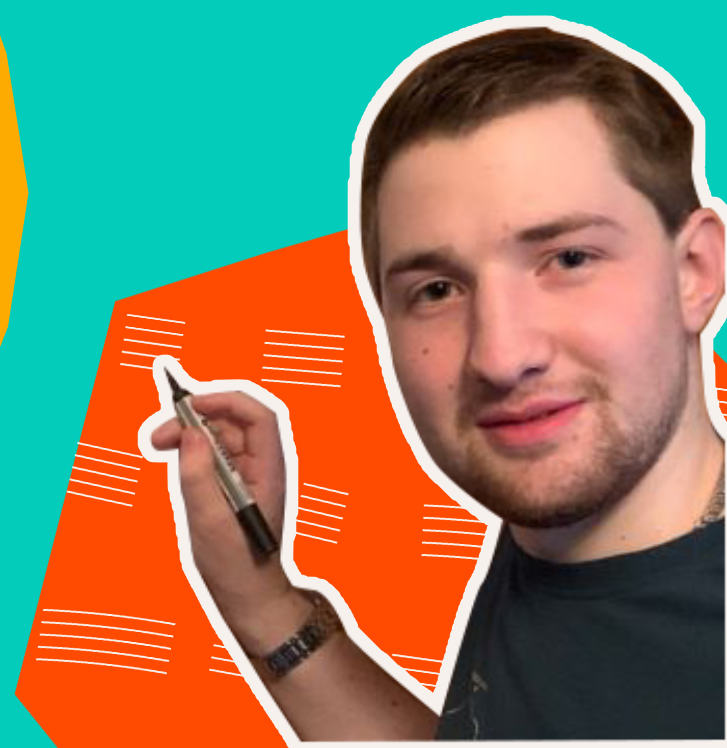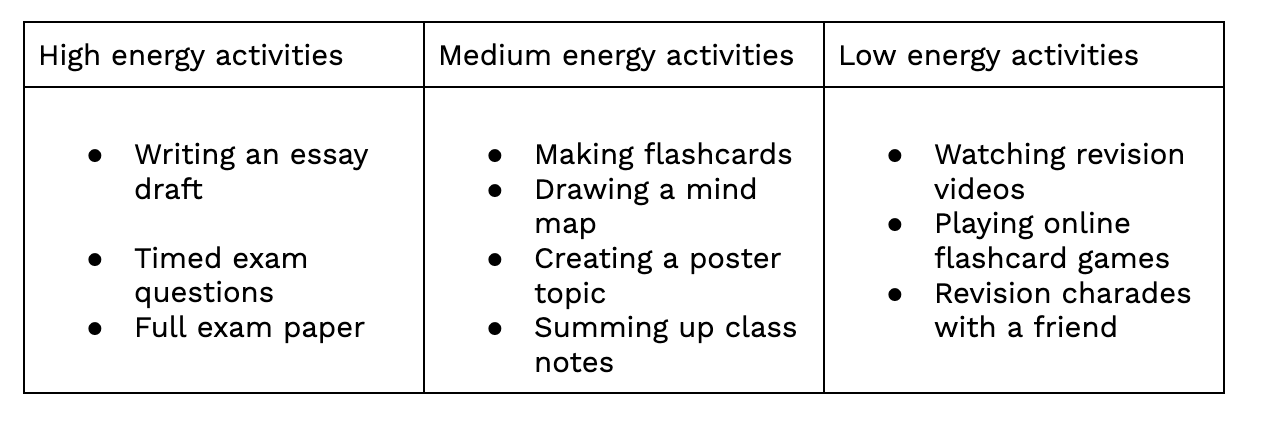Learning isn’t one-size fits all. But it can feel that way– especially when you’re in a big classroom. You might think, ‘I should be able to keep up with my classmates.’ But the truth is that we all learn in our own way and at our own pace.
Here, we’ll help you work out what your study habits are, and how you can tap into your strengths so that you’re feeling your best at school and beyond. And for some extra inspiration, our tutors share their own learning journeys and study tips to boost your motivation.
What are your study habits?
We don’t have to tell you that you’ve got your own likes and dislikes about everything– from school subjects, to films and music. The same goes for the way you learn. There are some techniques you go back to over and over again out of habit. Maybe you like to watch videos or listen for key information in a recording or you’re a big fan of mind maps.
To help you work out what your study habits are, answer these questions:
- How do I usually study? (for example, by reading over notes? Watching videos? Drawing? Partnered work?)
- Which kind of study activities do I like the most? (debating? Making diagrams? Quizzing a friend?)
- What kind of study activities do I usually dread? (drafting essays? Reading from a textbook? Group work?)
While it’s useful for you to know about your go-to study habits, try not to give yourself a label, like, ‘I’m a visual learner’. There’s more than one way they take in information, and using lots of different study techniques and activities can help you go deeper when you’re learning a subject.
Our tutors’ top study tips
Our tutors – who are students themselves at top UK unis – know that every person learns differently. When they’re revising, they even change up how they study depending on the subject.
Here, they take you through different ways they study, and how they guide their own students to tap into their strengths.


“Using songs, movies and radio can be really helpful when students are learning a language. Copying a phrase from a board 10 times and hoping it will sink in might feel like a drain. Hearing the way real people talk in French can be really motivating and it gives you something to shoot for. I use songs and chants to learn tenses and other important grammar points, even though it might seem cringy. Usually, the cringier the song, the more it sticks!”
– Eddie, French and Spanish tutor


“As someone who has learning difficulties, I can say that it’s super important to give yourself plenty of breaks. And make sure that you use your break time to do something relaxing or something you love.”
–Katie, English Literature and English Language tutor


“Mind maps with unique pictures to go with the info can help make the information stick. Watching films or TV adaptations of texts to see what themes are conveyed in different performances are so helpful (especially for Shakespeare!). Doing as much prep ahead of the exams as possible is key going into the exam season feeling relaxed.”
–Simon, English tutor


“It can be really hard sometimes to revise when you’ve got a learning challenge. I struggled with organisation and time management and I found it difficult to concentrate too. My best advice is to work in short chunks and to have lots of little breaks between to recharge. If you can find tech (like a screen reader or something that converts speech to text) that can be a really useful aid! Also breaking information into small chunks can make the work seem less overwhelming.”
–Beth, Maths tutor


“I used different techniques depending on what subject I’m studying– and even what I’m trying to learn. Flashcards are perfect for remembering key words! Brain dumps are a great study hack for active recall – I mostly use them to link concepts across a topic.
For A-level Physics, I mostly used exam questions and spaced repetition to understand key words. But brain dumps were most useful for connecting concepts and equations.”
-Déna, Biology and Physics tutor


“For Business at A-level, I mainly used mind maps. But to help me answer 20 markers for Maths, I practise doing past papers. They help with getting your head into exam-mode.”
–Abbie, Mathematics tutor


“In A-Level History I often used the blurting technique. This is when you write down facts about a topic on paper from memory and then correct what you missed. For History, you need to remember lots of information about a topic to write an essay, so that technique really worked for me. I used flashcards and topic questions for A-Level Chemistry and Biology. With those subjects, it’s not just about remembering and writing down information, it’s about being able to apply that knowledge.”
–Orla, Chemistry and Biology tutor
Did you recognise any of your own study techniques? Of course, what works for one person might not work for another. But trying out different strategies can help make the information sink in better.
Mixing things up
Studying in the same way over and over again can get boring fast and it’s actually not the best use of your time. Our expert tutor Matt suggests mixing up study activities. By doing this, you’re giving yourself more chances to go deeper into learning.
Study menu to match your mood
To get a variety of study activities in (like a well-balanced diet!), you can put together a menu, made up of high, medium and low intensity activities. So that it’s easily on hand, pin the menu up to a corkboard above your desk or have it on your phone.


Here’s how the study menu works:
When you’re revising, pick activities from the study menu that best suits your mood. So if you’re tired after a long day at school, choose an activity from the low energy list. You’ll still be learning, but it doesn’t have to feel like torture. And that’s a key part of learning– enjoying the process!
Here are a few examples of high, medium and low energy activities you can add to your menu, from our tutor Matt:


Tapping into your strengths
Even if it doesn’t feel like it now, there are lots of things you’re good at. Whether it’s skateboarding, playing football, public speaking or looking after your cat– there are things you do well. And it all comes down to feeling passionate about what you’re doing.
If you’re thinking, ‘I can’t be passionate about GCSE Maths!’- we get it. But you can be curious and feel a buzz when you solve a problem on your own. A lot of the time, students dislike subjects that they’re struggling in.
Here are some ways you can tap into your strengths:
- Be OK with making mistakes. If you think of mistakes as a normal part of learning, then you’ll feel less overwhelmed when challenges come up. So many famous people have faced setbacks and failures, and have gone on to do amazing things.
- Keep doing activities you love. Doing what you love puts you in a flow state– and that’s a great way to build up your confidence. When you feel good about yourself, it affects everything– even how you get on at school.
- Reach out for help if you feel lost. Sometimes, you just need an extra hand in a subject. Our tutors are pros at revising and are curriculum experts who can help you get back on track. You can also join our free group tutorials this autumn term by signing up to MyTutor Squads.
If you’ve ever left a class lesson feeling confused about what’s going on– you’re not alone. And it doesn’t mean that you’ll never understand the material. It’s just a matter of going over it in different ways until it clicks into place for you. And 1-1 support with someone who understands where you’re at can be just what you need to catch up. Go with how you feel– and know that there is support there for you, when you’re ready.




